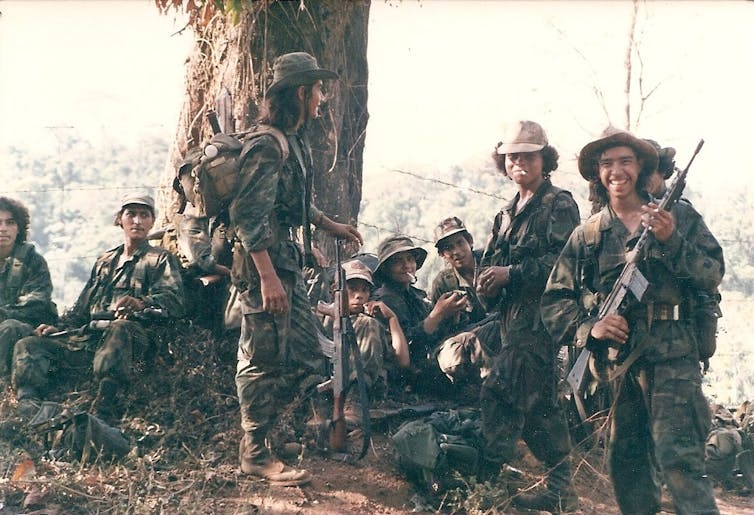Congress has a chequered history of overseeing US intelligence and national security
Tonya Ugoretz, a top FBI intelligence analyst, was placed on administrative leave in June. The FBI has not said why. But the decision came around the time she refused to endorse what was reportedly a thinly sourced report accusing China of interfering in the 2020 US presidential election in favour of Joe Biden.
At the Bureau, loyalty tests and polygraph checks have also allegedly become routine as part of a crackdown on news leaks. When approached by the New York Times about the matter, the FBI declined to comment and cited “personnel matters and internal deliberations”.
The situation does not seem to be much different at the CIA. In May, agency director John Ratcliffe ordered a review of the intelligence community’s earlier conclusion that Russia had interfered in the 2016 presidential campaign on behalf of Donald Trump. The conclusion, Ratcliffe contends, was unwarranted and imposed by political pressure – a claim that has been rejected by one of the report’s leading authors.
The intelligence community has reportedly also been under pressure to substantiate Trump’s claims that the recent military strikes on Iran had obliterated its nuclear sites. This is despite mixed evidence regarding the extent of their success. These examples suggest a growing politicisation of intelligence and national security in the US.
Researchers and observers have highlighted the detrimental effect of this process. When intelligence is conducted by ideologues that are screened for loyalty, it often becomes more about pleasing the leader than collecting accurate information and preventing failure.
Less attention has been paid to the permissive attitude of Congress. Many Republicans in Congress have taken an unquestioning attitude toward the claims made by the president and other officials, allowing intelligence agencies to pursue Trump’s agenda unimpeded.
While Trump and Patel’s focus on personal loyalty when it comes to intelligence is new, partisan influence in congressional oversight is not. In fact, Congress has a long history of supporting the intelligence priorities of the governing administration.
For much of the cold war, Congress was not involved – and did not want to be involved – in matters of intelligence. This view was expressed by former CIA legal counsel, Walter Pforzheimer, during an interview in 1988. Reflecting on the early days of oversight, he stated: “It wasn’t that we were attempting to hide anything. Our main problem was we couldn’t get them [Congress] to sit still and listen.”
This quote isn’t entirely true. In research from 2023, I showed that Congress was more involved than was generally believed. The US-backed 1954 coup in Guatemala, which deposed the democratically elected president, Jacobo Árbenz, is a case in point. Leading members of Congress were “in the know” and others pushed Dwight Eisenhower’s administration to be even more aggressive.
But Congress took on a more active role in intelligence matters in the 1970s. Following a series of public revelations about the CIA’s behaviour, a select committee was established in 1975 and exposed abuses by intelligence agencies including the surveillance of US citizens, experiments with drugs and involvement in assassinations.
In the wake of this, Congress established intelligence committees with oversight duties. The idea was that the CIA would present a document signed by the president to notify congressional committees of its intentions.
However, the system ran into trouble in the 1980s, and partisanship and politicisation were part of the story. The Ronald Reagan administration’s support for the “contra” rebels in Nicaragua made intelligence a matter of severe partisan conflict.
Removing Nicaragua’s government
When Reagan took office in 1981, one of the primary foreign policy priorities for his administration was removing the Sandinista National Liberation Front from power in Nicaragua. The administration saw the Sandinistas as a threat to the region and – in Reagan’s black-and-white thinking – as puppets of Communist Moscow and Havana.
The administration sought to convince Congress that its aims were limited. The aim, or so CIA director William Casey told the intelligence committees, was to obstruct the transfer of weapons from Nicaragua to neighbouring El Salvador. Another left-wing guerrilla movement, the Farabundo Martí National Liberation Front, was threatening the US-supported government there.
Initially, the policy received bipartisan support in Congress. The linchpin of this policy was the creation of an insurgent group in Nicaragua called the contras (contrarevolucionarios). It was made up of members of the previous regime’s brutal national guard, as well as other groups that had become disgruntled with the Sandinistas.
Nicaraguan contras, who fought against the Sandinista government in Nicaragua during the 1980s.
Tiomono / Wikimedia Commons, CC BY-NC-SA
News stories soon made clear that the size of the contra army had radically expanded, from the 500 members discussed by Casey in his initial briefing to thousands. The contras’ stated goal of overthrowing the Sandinistas, which they ultimately failed to do, also contradicted the earlier Reagan administration’s statements to Congress.
Democrats in Congress pushed the leadership of intelligence committees to curtail the administration’s activities. Edward Boland, chairman of the House Intelligence Committee, penned and helped to pass two amendments. The first prohibited any US government support for the purpose of overthrowing the Nicaraguan government.
When the administration found loopholes to circumvent this, Boland’s second amendment prohibited any US funds from being spent in support of the contras. This amendment is generally understood as a first step towards the so-called Iran-Contra scandal.
The Reagan administration illegally funded the contras behind Congress’s back by using the proceeds from secret arms sales to Iran – a state the US had been at loggerheads with since the 1979 Islamic revolution.
The Boland amendments also helped make an intelligence and covert operations issue a matter of public debate and – more importantly – congressional votes. Republicans in Congress abandoned their oversight duties and followed the administration’s guidelines.
Votes on contra aid became an opportunity for partisan controversy, vitriolic attacks, accusations of betrayal and large-scale influence campaigns. Instead of oversight, a deep partisan divide materialised.
Counting on Congress? Think again
The role of Congress is to conduct oversight. It is the role of the governing administration to keep Congress informed of intelligence matters, particularly covert operations. History shows this has often been hard to achieve.
Congress has been complacent, complicit and often too willing to follow the government’s lead. In some cases, Congress has acted but primarily in the aftermath of major scandals or media revelations. This is called “firefighting” behaviour.
But “firefighters” seem to now be in short supply. As much as domestic constraints on Trump’s power are decreasing, the same is happening in the context of intelligence and foreign policy.
Get your news from actual experts, straight to your inbox. Sign up to our daily newsletter to receive all The Conversation UK’s latest coverage of news and research, from politics and business to the arts and sciences.
Luca Trenta received funding from British Academy Grant SRG21211237.



